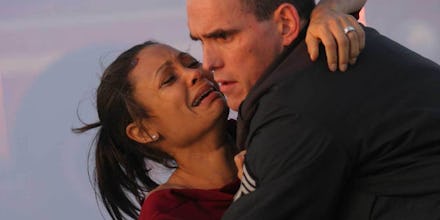10 Years Ago, the Oscars Made Their Worst Best Picture Choice Ever: 'Crash'

Oscar watchers looking for something to change in 2016 after an all-white acting lineup last year were sorely disappointed Thursday morning. For the second year in a row, every single acting nominee at the Oscars is a white person.
Reactions to this development were expectedly furious, but comedian Rob Delaney had perhaps the best: He brought it back to Crash.
Crash is perhaps the most infamous best picture ever, and it certainly is the worst in recent memory. Over the critically beloved Brokeback Mountain, Oscar voters chose to go with director Paul Haggis' misguided parable about race in 2004 Los Angeles. The decision was so off the mark, even Haggis himself now says it was incorrect.
But in light of this year's egregiously white Oscar nominations, it's worth looking back at Crash. Surely it can't be as bad as remembered, right? This was a movie a body of voters decided was the best of the year. At worst, even if it's a bit clumsy about racial tensions, it must at least work as a piece of filmmaking, right?
Wrong. Crash is not as bad as you remember it. It's worse.
Here is a list of just some of what happens in Crash to refresh your memory:
1. Ludacris and Larenz Tate call out Sandra Bullock and Brendan Fraser for implying through body language that they were scared of them. They then proceed to prove Bullock and Fraser right by carjacking them.
2. Michael Peña comes to change Bullock and Fraser's locks, but Bullock loudly calls him a "gangbanger" because of his tattoos.
3. Matt Dillon and Ryan Phillippe, both playing police officers, catch Thandie Newton giving Terrence Howard road head. Dillon then racially profiles them and molests Newton during an inspection.
4. Bullock yells at her maid.
5. Dillon gets in an argument with Loretta Devine, a health insurance representative, and tells her a qualified white man lost an opportunity because she was a black, female hire.
6. Newton gets in a nearly fatal accident, but Dillon, who has happened upon the scene, saves her. She weeps in his arms.
7. Sandra Bullock hugs her maid.
8. Phillippe picks Tate up, then after a misunderstanding where he thinks Tate is reaching for a gun, shoots and kills him. He leaves Tate's body and burns his own car.
This is the movie that won the Oscar for best picture over Brokeback Mountain. This is the movie that Roger Ebert said would probably move its viewers "to have a little more sympathy for people not like themselves."
What were Academy voters in 2006 thinking?
There's no subtext or subtlety to anything that happens in Crash. Bullock's character angrily calls Peña's character a "gangbanger" one day solely because he's Latino and has tattoos. The next day, she's hugging her Latina maid. Look, the movie says, she's not racist!
The same happens, even more egregiously, with the two police officers. Dillon's character, despite spewing racist bile, gets to have the redeeming moment where he saves the woman he physically violated the day before. Meanwhile, Phillippe's character is revealed to be the real racist — he's the one who thought Tate's character was pulling out a gun and shot him dead.
Let's give the Academy the absurdly generous benefit of the doubt and say Crash was made in a different time. From a 2016 perspective, many of these plot strands may look more problematic than they did then. This isn't really true — there were critics at the time who saw the movie for what it was — but the movie did enjoy a high critical average. Clearly, though historical hindsight is 20/20, Crash enjoyed support in the moment.
This still doesn't excuse Crash's win. From a pure filmmaking perspective, the movie is laughable. Story threads are pushed together in inorganic ways to make the movie appear more connected. Character development is forced and jarring, telegraphed in broad and cartoonish fashion (again, Bullock's growth is shown by hugging her maid).
More than anything, Crash just doesn't actually say anything. It's a group of blunt observations and manufactured stories that, put together, lead to no clear conclusion. "Racism exists"? Cool, that was pretty well-known before Crash. "Racism is bad"? Also good to know, but not particularly novel. The film reveals nothing new or interesting, let alone moving, about the human experience. It's a thoroughly bad movie.
From a pure filmmaking perspective, 'Crash' is laughable.
A decade after Crash's win, the Oscars are facing a whole new race-based controversy. Yet looking back at said victory, it feels all the more like a foreshadowing of the future. This year, Creed's Sylvester Stallone and the white writers of Straight Outta Compton are the only nominees from their otherwise black filmmaker- and actor-driven films.
Back in 2006, Crash managed only one acting nominee from a racially diverse ensemble: Matt Dillon. The Oscar-winning producers (Haggis and Cathy Schulman) writers (Haggis and Robert Moresco) and editor (Hughes Winborne) for the film were also all white. Turns out #OscarsSoWhite is older than we think.